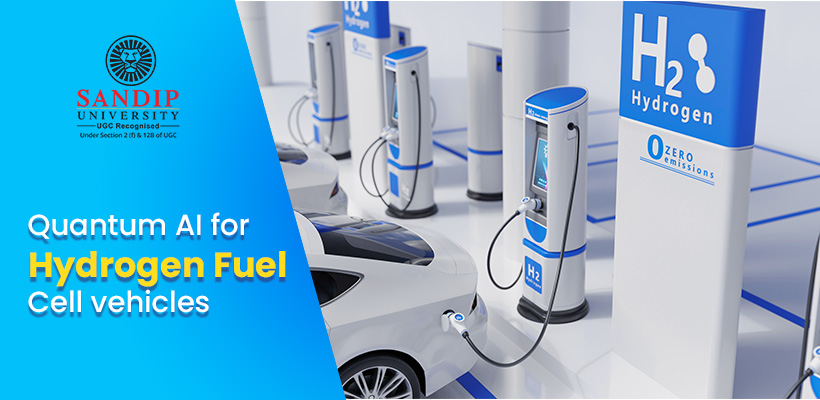Quantum AI, the fusion of quantum computing and artificial intelligence, is an emerging field poised to revolutionise various domains. Quantum AI can play a significant role in the advancement and optimisation of hydrogen fuel cell vehicles (FCVs) by addressing key challenges in materials discovery, system design, and performance optimisation.
Many top engineering colleges in Nashik are training students in developing quantum AI and hydrogen fuel cell vehicles for the future. Here are some potential applications of Quantum AI in the development of hydrogen fuel cell vehicles:
- Materials Discovery and Catalyst Design
- Quantum AI algorithms can accelerate the discovery of novel materials and catalysts for hydrogen fuel cells, improving their efficiency, durability, and cost-effectiveness.
- Quantum simulations and machine learning techniques can predict the properties and performance of candidate materials, facilitating the identification of promising candidates for fuel cell components such as membranes, electrodes, and catalysts.
- Quantum-inspired optimisation methods can design and optimise molecular structures to enhance catalytic activity, reaction kinetics, and proton conductivity in fuel cell systems.
- Fuel Cell Performance Optimisation
- Quantum AI can optimise the performance of hydrogen fuel cells by modelling and simulating complex electrochemical processes at the atomic level.
- Quantum simulations can predict the behaviour of proton exchange membranes, electrode-electrolyte interfaces, and reaction kinetics in fuel cell systems, providing insights into performance-limiting factors and degradation mechanisms.
- Quantum-inspired algorithms can optimise operating conditions, electrode designs, and catalyst compositions to maximise fuel cell efficiency, power density, and durability.
- System Integration and Control
- Quantum AI algorithms can optimise system integration and control strategies for hydrogen fuel cell vehicles, improving overall performance, reliability, and safety.
- Quantum-inspired control algorithms can optimise power management, energy storage, and thermal management systems to ensure efficient operation of fuel cell vehicles under various driving conditions.
- Quantum reinforcement learning techniques can train autonomous control systems to adaptively adjust fuel cell operation parameters based on real-time sensor data, driver behaviour, and environmental conditions.
- Hydrogen Production and Distribution
- Quantum AI can optimise hydrogen production and distribution infrastructure to support widespread adoption of hydrogen fuel cell vehicles.
- Quantum-inspired optimisation techniques can identify optimal locations for hydrogen production facilities, storage tanks, and refuelling stations, considering factors such as energy availability, transportation costs, and market demand.
- Quantum reinforcement learning algorithms can optimise hydrogen production processes, electrolyser operation, and supply chain logistics to minimise costs and environmental impacts.
- Life Cycle Assessment and Sustainability
- Quantum AI can facilitate life cycle assessment and sustainability analysis of hydrogen fuel cell vehicles, considering environmental impacts, energy consumption, and resource utilisation throughout the vehicle lifecycle.
- Quantum-inspired models can quantify the environmental benefits of hydrogen fuel cell vehicles compared to internal combustion engine vehicles, taking into account factors such as manufacturing emissions, vehicle operation, and end-of-life disposal.
- Quantum reinforcement learning techniques can optimise vehicle design, production processes, and supply chain practices to minimise environmental footprint and maximise sustainability.
Conclusion
Overall, Quantum AI holds great promise for advancing the development, optimisation, and adoption of hydrogen fuel cell vehicles, contributing to a cleaner, more sustainable transportation ecosystem. However, realising these benefits will require further research, collaboration, and investment to overcome technical challenges and scale Quantum AI solutions for real-world applications in the automotive industry.

